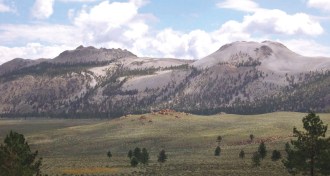Alexandra Witze is a contributing correspondent based in Boulder, Colorado. Among other exotic locales, her reporting has taken her to Maya ruins in the jungles of Guatemala, among rotting corpses at the University of Tennessee's legendary "Body Farm," and to a floating sea-ice camp at the North Pole. She has a bachelor's degree in geology from MIT and a graduate certification in science communication from the University of California, Santa Cruz. Among her honors are the Science-in-Society award from the National Association of Science Writers (shared with Tom Siegfried), and the American Geophysical Union's award for feature journalism. She coauthored the book Island on Fire, about the 18th-century eruption of the Icelandic volcano Laki.

Trustworthy journalism comes at a price.
Scientists and journalists share a core belief in questioning, observing and verifying to reach the truth. Science News reports on crucial research and discovery across science disciplines. We need your financial support to make it happen – every contribution makes a difference.
All Stories by Alexandra Witze
-

-
 Physics
PhysicsQuantum teleportation leaps forward
Two teams report beaming information about particles over long distances, a step toward creating satellite quantum communication networks.
-
 Astronomy
AstronomyMilky Way will be hit head-on
The Andromeda galaxy is destined to slam directly into ours, new observations from the Hubble Space Telescope show.
-
 Earth
EarthSupervolcanoes evolve superquickly
Huge underground chambers of magma appear and erupt within just several centuries, a study of California rocks suggests.
-
 Tech
TechDNA used as rewritable data storage in cells
Genetically encoded memory could track cell division inside the body.
-

-
 Chemistry
ChemistryDancing droplets reveal physics at work
Magnetic fields can deflect liquid oxygen subject to the unusual “Leidenfrost effect.”
-
 Earth
EarthNatural sinks still sopping up carbon
Ecosystems haven’t yet maxed out their ability to absorb fossil fuel emissions, new calculations suggest.
-

-
 Physics
PhysicsPhysicists go totally random
Calculations suggest a way to boost the independence of information flow, a finding that could help in cryptography.
-
 Earth
EarthStop-and-go plate tectonics
Early on, ancient crustal plates may have dived deep into the Earth, time and again, giving a halting start to the planetary remodeling process.
-
